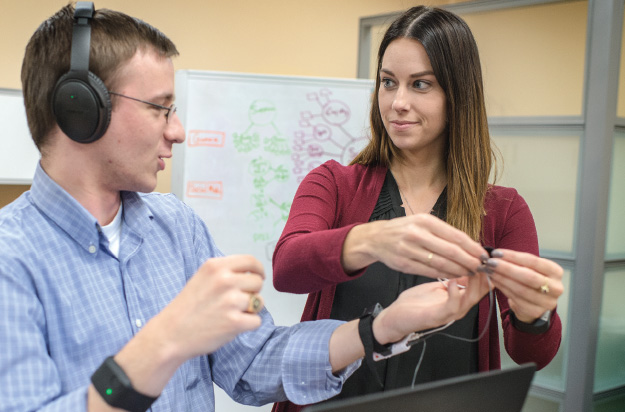Winter 2016: Energy Evolution
From carbon dioxide conversion to landfill mining, researchers at UTA are seeking viable alternative energy options.
Skip to content. Skip to main navigation.
From carbon dioxide conversion to landfill mining, researchers at UTA are seeking viable alternative energy options.
Found in everything from space shuttles to dental fillings, composite materials have thoroughly infiltrated modern society. But their potential is still greatly untapped, offering researchers ample opportunity for discovery.
Within the particle showers created at the Large Hadron Collider, answers to some of the universe’s mysteries are waiting.
Model systems like pigeons can help illuminate our own evolutionary and genomic history.
UT Arlington's tiny windmills are bringing renewable energy to a whole new scale.
The stability of our highways, pipelines, and even manholes is reaching a breaking point.
Scientists believe they have discovered a subatomic particle that is crucial to understanding the universe.
UT Arlington researchers unlock clues to the human body’s most mysterious and complex organ.
UT Arlington researchers probe the hidden world of microbes in search of renewable energy sources.
Wounded soldiers are benefiting from Robert Gatchel’s program that combines physical rehabilitation with treatment for post-traumatic stress disorder.
Tiny sensors implanted in the body show promise in combating acid reflux disease, pain and other health problems.
Nanotechnology researchers pursue hybrid silicon chips with life-saving potential.
Biomedical engineers combat diseases with procedures that are painless to patients.

A duo of psychologists has discovered that adolescents with low attention control may be more likely to develop anxiety disorders. In turn, this could leave them vulnerable to issues like depression, drug dependence, suicidal behavior, and underachievement in education.
Catherine Spann, a researcher at UTA’s LINK lab and recent Ph.D. graduate, along with former Assistant Professor Jeffrey Gagne studied 440 twin pairs with a mean age of 13.6 years old to track the effects of genetic versus environmental influences on their attention levels and anxiety symptoms. Using a combination of self-ratings and parent ratings, the researchers assessed attention control and scores for obsessive, social, separation, and generalized anxiety symptoms.
They found that genetic influences were significant and overlapping across attention control and all anxiety variables, a pattern suggesting that low attention could be a phenotypic and genetic risk factor for anxiety. Risk levels varied depending on each type of disorder, with the highest being for generalized and separation anxiety symptoms.
“Adolescence is an important development period,” says Perry Fuchs, chair of the Department of Psychology. “Better assessment of teens’ ability to concentrate could facilitate the identification of those at risk for anxiety and could also inform molecular genetic studies, which would be the logical next stage for research.”
Drs. Spann and Gagne’s work was published in the Journal of Research on Adolescence. University of Wisconsin–Madison faculty Deirdre O’Sullivan, Nicole Schmidt, and Hill Goldsmith also participated in the study, which was supported by the National Institute of Mental Health.